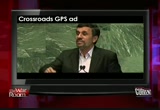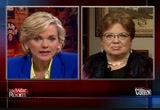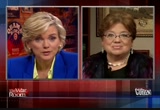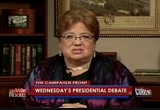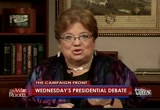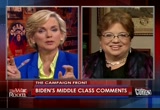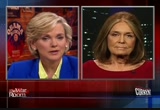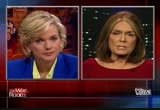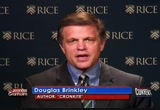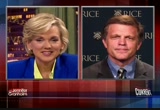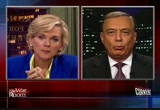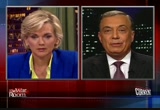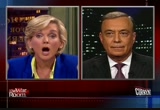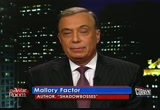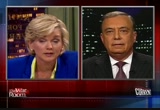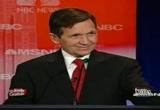tv The War Room With Jennifer Granholm Current October 2, 2012 7:00pm-8:00pm PDT
7:00 pm
>> my thanks to jenny mccarthy anna coulter and kevin powell as well. good night. >> jennifer: i'm jennifer granholm. tonight in "the war room," a formal discussion in which opposing arguments are put forward and so much more. 24 hours from now, two men will take to a stage and debate their competing visions for the future of america. and as they look forward, it is perhaps fitting we look back, taking measure of the things we have fought hardest for and always remembering that inalienable doesn't mean unassailable. the right to vote is being fought for. the right to choose is currently under siege. the right to organize is seen as a threat to the most powerful among us. we should not forget the difference between a game changing moment and a game changer.
7:01 pm
>> jennifer: good news today out of pennsylvania. the judge has blocked the state's tough voter i.d. law meaning it will not go into effect this election. >> we've come like moses today not to say let my people go but we've come today to say let my people vote. >> jennifer: let my people vote. you'll remember this was the law that would have disenfranchised as many as 750,000 people in pennsylvania. mostly young people and minorities and a top republican lawmaker had boasted in june that it would give the state to mitt romney. pennsylvania's actually part of a wider trend. measures to restrict voting are being stymied in courts in wisconsin, texas florida arizona, south carolina, and
7:02 pm
ohio. stymied by the court system. but the not so good news is that these laws are not going away. the pennsylvania law has just been suspended not struck down and other state courts are likely going to consider similar restrictions. pennsylvania is not even seen as a swing state anymore. the president now leads by 8 points according to an average of the polls from real clear politics and both candidates have actually pulled their ads and their money there. but the heat is on in ohio. where early voting started today. over a third of the state's electorate is expected to vote early. and they're already coming out in force in cincinnati last night, dozens camped out overnight waiting to vote this morning and it was the same scene in youngstown, ohio. for this week only, for this week only, voters can register and vote on the same day. right now the real clear
7:03 pm
politics poll average has the president ahead in ohio by 5.5 points. now that lead is propelled by a 25--point advantage among women and a 35-point edge among young people according to a "new york times," quinnipiac poll. mitt romney is hoping to win voters back from ohio with help from a new ad from karl rove's crossroads what republicans are calling october surprise. this october surprise is an attack on the president's foreign policy. >> but what did president obama do the same day of a terror attack on american citizens? he campaigned in las vegas. then at the annual u.n. meeting where rogue nations are calling for a new world order obama snout key allies and skipped meetings with world leaders so he could be on tv. president obama needs to learn
7:04 pm
being president isn't just about being on tv and protecting your job, it's about leadership. it's time for a president who gets it. >> jennifer: so will it work? will that ad work? will the october surprise work? for more on all of this, i'm joined by washington from democratic pollster salinda lake. so glad to you have back inside "the war room." thank you for joining us. >> thank you for having me. >> jennifer: you bet. so salon is reporting that republicans plan to unleash that october offensive attacking the president as weak on national security and that they're going to allege that the obama administration had positive intelligence that there was going to be a terrorist attack in libya. is that attack going to work? >> not at all. in fact, what's interesting is in the last week, when the republicans have been doing trial balloons with this attack, the president's advantage on
7:05 pm
foreign policy has actually increased. in the battleground poll, it increased by a third. over this period in time. the president's credentials on foreign policy are well-established and what's different about the president and mitt romney is the president has a record and he doesn't play politics with foreign policy. and i think that provides a great deal of security to voters. voters also rank the president as ahead of mitt romney on strong leadership. and that strong leadership is highly correlated with the decisive actions he's taken in foreign policy whether it is getting us out of iraq or finding osama bin laden or waiting to get the information before you incorrectly shoot from the hip which is what mitt romney did about libya. >> jennifer: that october surprise won't work. who knows if there is another one. there is a debate coming up tomorrow. 38% of voters say the upcoming debates actually are going to be important in helping their vote, make their vote.
7:06 pm
38% according to this new nbc news "wall street journal" poll. have people really -- 38% not made up their minds? >> you know, it is a really interesting question because we have never gone into a debate with voters as polarized as they are today. and with as few undecideds as there are today. it is a really interesting question governor, about how many voters really will be influenced by the debate. the other thing that's interesting is it's actually obama voters who are more likely to say they're interested in the debates than the romney voters. it is almost like we want to see our guy get up there and really take it to romney. so i think that it is unlikely that the debate will influence that many people. both of these candidates are good debaters. it is a format that both of them, i think will come across as leaders and knowledgeable. so i bet it doesn't move that many voters unless someone makes a mistake. we'll see.
7:07 pm
we've never been in this terrain before. >> jennifer: you've been doing this awhile. how much impact do debates on the presidential level really have usually? >> usually, they can have quite a bit. particularly for a challenger. you've been in this situation too. i have to commend you governor, you're one of the few women officeholders who decisively won her debates. usually to is harder for women to win their debates. you really killed your opponent in the debates. you have a lot of good advice to give in this regard. but it helps the challengers usually because it is the first time they're on a level playing field. people don't know them as well. it is an opportunity for them to introduce themselves biographical or in terms of strong leadership. also if you make a mistake in a debate and both of these candidates are not prone to mistakes but if you make a mistake, if you do a $10,000 bet like mitt romney did or if you place poland in the wrong part of the world like gerald ford did, it can really damage you and it is not even actually what you do in the debates.
7:08 pm
it is the post-debate interpretation. the news reports afterward what appears on saturday night live and the daily show actually influence people more than the actual debate where they don't know exactly to make of it. >> jennifer: well today there's obviously a whole realm of possibilities for misstatements and missteps. today joe biden said something that's getting a lot of play on the right. take a listen to this. >> how they can justify -- how they can justify raising taxes on the middle class has been buried the last four years, how in lord's name can they justify raising their taxes? >> jennifer: so biden of course supposed to help with white middle class voters. his comments about the middle class being buried were -- he was talking about romney's plans to raise taxes on the middle class. but the right and their surrogates are out having press conferences about this right
7:09 pm
now, probably as we speak. is that kind of going to hurt? >> actually, i think if you ask the voters, i think joe biden proved what's great about joe biden. he gets it. he's in touch. you know what? 80% of the voters agree. this economy has been bad. people have been buried. that's why they want to elect a president and a vice president who get it. who are in touch and will have policies that help the middle class, not millionaires. so i agree with the vice president. i think 88% of the voters would agree, too. >> jennifer: i just love joe biden. he's just -- he's just the greatest. he really is. thank you so much as ever for coming inside "the war room." >> thank you. >> jennifer: you political junkgies, a big tuesday night with big names in "the war room." there are leaders in the feminist movement and then there's gloria steinem. her take on the war on women and the election is next. and in the spirit of phrases conservation, there are
7:10 pm
political historians and then there's douglas brinkley. he'll take us on an historical tour of debates past. and later, a compelling documentary about a city near and dear to my heart detroit michigan. we're going to meet with the filmmakers behind detropia. >> the shanghai automotive and the government of china is requesting and pressuring general motors in order for them to sell in their markets to share their intellectual property. presidential debate. with unrivaled analysis and commentary. (vo) the only network with real-time reaction straight from the campaigns and from viewers like you. >>now that's politically direct. (vo) brought to you by communications workers of america. bring jobs home now.
7:13 pm
>> jennifer: as we mentioned earlier, the president has a big lead among women in ohio. a full 25--point advantage but he now also leads among female voters nationwide by 18 points. that 18-point lead is unprecedented. >> no candidate has ever won either gender by such a large margin. at least in the 90 years since women got the right to vote. the margin among men which exists is 10 points. 10-point lead for romney. so why are women so decisively in the democrat's camp? well, it might surprise of some you but it's not just about reproductive rights. in fact, pew research finds the number one issue for women is -- you ready? the role of government. 45% of women think government should play an active role in society. just 36% of men do. that role includes providing things like programs for children, for the poor and the
7:14 pm
elderly, having a safety net in our country. so republican proposals to slash government services, to slash the safety net are hurting them. those proposals with women. and their extreme views on reproductive views can't be helping them either. here to talk about that is a woman who's been on the front lines of the fight for decades. i'm so excited and honored to be able to welcome into "the war room," the legendary gloria steinem who's endorsed president obama's re-election campaign. thank you so much for joining us inside "the war room." >> thank you. >> jennifer: so how did we come to a point 236 years into our nation's history when one gender so overwhelmingly sides with a single party and really, i would love your take on what does that mean for our democracy? >> i think what we're seeing now is that the republican party has been taken over by a backlash against all of the social justice movements.
7:15 pm
against the women's movement. against the civil rights movement, the gay and less lesbian movement. actually, i would like to say especially to my republican women friends these folks are not republicans. a lot of them used to be democrats. and started to lead the republican party when the civil rights act of 1963 passed and so on. so my -- really what's happened is that one party has campaigned against women you know. women have responded to that. >> jennifer: so you're stumping for the president. is president obama a feminist? >> yes i think he's a feminist. we had worked with him in illinois when he was in the state legislature. and he supported all of the issues of equality and he supported reproductive freedom. and the point is any way that feminist is a word that we chose because it could apply to men as well as women.
7:16 pm
and it -- it just means a person who is in favor of full social economic political equality of women and men and it is a great boon to men too. it actually has lengthened their lives, you know, to stop the extreme polarization of the gender roles. has lengthened the lives of men too. >> jennifer: i totally agree. i wish that the right had not vilified the word feminist because you would want our daughters and our sons to be open to full equality in this society. >> but they vilified the word liberal. they vilified feminist. rush limbaugh says fem nazi every two minutes. they're vilifying it for its real content which is that it does stand for the equality of women and men. >> jennifer: if you could -- tomorrow, of course, big debate. if you could ask one question of say mitt romney in tomorrow's
7:17 pm
debate, what would you ask him? >> well, i would say how come you don't see to understand that equal pay for equal work would be the most effective economic stimulus possible. it would put $200 billion more into the economy exactly where it is most needed and it is most likely to be spent and create jobs. but he has not even supported the led better equal pay act. he doesn't support equal pay. >> jennifer: it is an amazing thing. policy makes a huge difference in terms of leveling the playing field. you have been strongly supportive of women to be in policymaking positions. in fact, in 2008, you wrote an op-ed in "the new york times" endorsing hillary clinton for president and in it, you wrote that the sex barrier is not taken as seriously as the racial one. do you still feel that way? >> well, you know, it depends on
7:18 pm
the situation. i think each person in this situation should be able to judge and that's especially true for women of color who may find themselves dealing with both in different situations. so there's no competition of tears here. they're both wrong. but obviously women are half of every group. so it's more extensive. it may or may not be more serious given the situation. but it's more extensive. >> jennifer: do you predict that we'll have a female president in the next four to eight years -- i shouldn't say four. maybe i would say four. 2016, is it possible? >> well, sure it is possible. i, frankly, did not think that hillary clinton could win not because of her but because of the fact that as long as most of us are -- men and women are raised primarily by women and
7:19 pm
not by men we associate female authority with childhood. and you could see from the response of big grownup television commentators who were saying things like i cross my legs whenever i see hillary clinton. ridiculous things. that they felt regressed by a powerful woman because the last time they saw one, they were 8. so you know, i think that only long-term answer is that both women and men raise children and both women and men are honored in authority outside the home. but i do think that hillary clinton herself was such a profound example of a woman who could be president that she changed the way people think. so i think it's much more possible now. but i would certainly not attempt to predict when. but you know, any way the important thing is that we make life more equal for most women. not just that we get a job for
7:20 pm
one woman. >> jennifer: right right. that's such a great point. and you just described -- you spoke just now in a way that i actually heard you speak in the same way at a women's conference earlier this year. the historian stephanie kuntz argues in the sunday "new york times" that while the male/female pay gap has shrunk, it recommends convergence in economic fortunes. not female ascendance. do you think women are doing better than they were when, for example, you started ms. magazine and if they are what policy should free member to up fully embrace their role as parent including full-time parent? >> well, obviously we've made huge progress in the 40 years since ms. magazine has been alive. we have laws against things that weren't even named then. they were just -- everyday
7:21 pm
experience like domestic violence and sexual assault. the laws were almost nonexistent. so -- and we've moved toward equal pay. we made huge, huge progress. i think what we need to do is now take that progress that we've made and project it into the future. and what would be very helpful to men would be the opportunity to express their full human selves and also care for children or be active in the home and so on. women develop our whole selves by being out there outside the home. men develop it by being inside. we're all striving to be fully human. so what we need is parental leave for men and women. we need to stop being the only advanced democracy in the world with no child care. you know we need to really seriously look at the issue of violence against women because it's caused by the idea of
7:22 pm
masculinity which is about dominance and control which also ends up shortening men's lives. so it helps everybody. and incidentally, it's the greatest indicator of violence -- institutionalized violence. there's a book now wonderful book called sex and world peace that shows that microviolence in the home against women is a better indicator than democracy national resources religion, anything else of macroviolence of institutionalized violence. so if i could ask both candidates a question, i would say given the fact that violence against women is demonstrably the single greatest indicator of military and institutionalized violence how does our foreign policy reflect this? i don't think it does. >> jennifer: that is a fantastic way to end this conversation.
7:23 pm
at least for now. i really appreciate you coming inside the peace room, "the war room." gloria steinem thanks for joining us. >> thank you. >> jennifer: up next, always one of my favorite guests is douglas brinkley. he has a perfect record when it comes to telling fascinating things about the history of politics that i never knew before and tonight's topic of course, what else would it be? presidential debates. >> governor -- >> there you go again.
7:25 pm
>> jennifer: you're back inside "the war room." i'm jennifer granholm. the most famous debates in american history may not have been between presidential candidates. they might have actually been the series of face-offs between illinois incumbent democratic senator steven douglas and his opponent republican abraham lincoln. let's take a look at a scene from the film abe lincoln in illinois which dramatizes their famous match-up.
7:26 pm
>> it is the old issue of human rights versus property rights. it is the eternal struggle between two principles. the one common right of humanity. the other the divine right of kings. it is the same spirit which says you toil and work and earn bread and i'll eat it. >> jennifer: how fantastic that would be to have language like that tomorrow night. debates, those debates dramatize there help to catapult a little known abe lincoln into national politics. coming to us tonight from houston to discuss the debates ahead of tomorrow's verbal bout between president obama and governor romney is douglas brinkley. douglas is a presidential historian. rice university professor and author of the new book "cronkite." welcome back inside "the war room." >> thanks, governor. thanks for having me.
7:27 pm
>> jennifer: you bet. so is it just me or do you also think that tomorrow's debate is being pumped up more than any other debate at least in my memory? >> well, i think so because it seems like it has been a longer campaign right? the media now -- every day really every second, people are watching what obama and romney says. it is the dominant story. i think people are feeling this is one of those elections of a lifetime which vision for america to go to. so it is a lot of hype for this one and there is a feeling now with barack obama up in the polls, three points nationally but up in some -- almost all of the swing states he might be able to close the deal with the american people tomorrow night if he has a good performance. on the other hand, as governor chris christie said over the weekend, if mitt romney comes in and is able to hold his own or even get a few good jabs in, he could get a bit of a bounce. he's been struggling. this is an important debate. the first one's always
7:28 pm
important. it set acetone and tenor for the others. >> jennifer: i love the fact we have these ringside seats for history in the making. we have unearthed a radio clip from the very first -- as far as we know, the very first official presidential debate. it was from a primary match-up between thomas dewey and harold stacken in 1948. lea take a -- let's take a listen to dewey. >> i'm wholeheartedly, unswervingly against any esteemed laws outlawing people because of their religious political, social or economic ideas. i'm against it because it's a violation of the constitution of the united states and bill of rights and clearly so. >> jennifer: something about that language that is fantastic. how important were the debates prior to the television era? >> well, it is a great question.
7:29 pm
it was one where you played the lincoln/douglas debates. we all talk about that. really from 1858 until 1960, john f. kennedy versus richard nixon, debates didn't play that big a role in presidential campaigns. there were no presidential debates. but you did have in primaries occasionally, squareoffs going on. interesting to even think about stats from minnesota rarely run for president -- stacken ran for president every four years. kennedy/nixon was the game changer in debate history. people that listened to it thought nixon won on radio but on television, john f. kennedy won. nobody was that happy with the debates. we had no debates in '64 '68 '72. came back in 1976 when jimmy carter ended up doing well because of gerald ford's famous gaffe. that's the big question.
7:30 pm
can you become gaffe-free? everybody is going to be looking wednesday night to see if there was a mistake made by either person. it puts a lot of pressure on the candidates. >> jennifer: you mention nixon and kennedy and those who saw the debate felt like kennedy won. what do you think is more important? what the candidates say or how they say it? >> i think it's how they say it. to be honest with you talk about the kennedy/nixon debates we all had visuals. what was the difference between kennedy and nixon? a little bit of a difference on cuba policy. little bit on how to win the cold war. but none of us remember what we remember is the visual of john f. kennedy looking dashing and handsome and nixon not wanting to apply makeup on and looking sweaty. so if you're going to read the transcript wednesday night, it could be very well a stalemate or both of them -- you know, held their own.
7:31 pm
but one gaffe one mistake, one eye roll, famously, you remember when george herbert walker bush looked at his wrist watch. it cost him. when al gore started talking about a lockbox and kind of looked very robotic and broke the body space of george w. bush in 2000, it hurt him. so it's those -- this is a theatrical event as much as it is policy. >> jennifer: so great. i can hardly wait. i totally love having you come inside "the war room" and bring us this sort of view from history. historian douglas brinkley joining us. thanks so much. after the break, when it comes to our views on public unions, well, let's just say there is a teeny bit of daylight between myself and our next guest. it will be an interesting conversation, i can promise you that and a little later, brett ehrlich picks up the presidential debate ball where douglas brinkley left off and he drops it. >> the key changes to the debate format that will change the face
7:32 pm
of american discourse forever! don't go away. you'd spot movement, gather intelligence with minimal collateral damage. but rather than neutralizing enemies in their sleep you'd be targeting stocks to trade. well, that's what trade architect's heat maps do. they make you a trading assassin. trade architect. td ameritrade's empowering web-based trading platform. trade commission-free for 60 days, and we'll throw in up to $600 when you open an account.
7:35 pm
>> jennifer: so if mitt romney now wants to make this election a choice and he's right. there is a choice. it is a debate about the role of government and creating a civil society, a society where we look out for one another but maybe give people the tools to become independent. or we can choose mitt romney. you remember what mitt romney told eye owe wants back in june about president obama. >> he wants to hire more government workers. we need more firemen more policemen, more teachers. did he not get the message in wisconsin, the american people did. it is time for us to cut back on government and help the american people. >> jennifer: so do the american people want us to cut the jobs of firemen policemen and teachers? well, sharp scrutiny on the role
7:36 pm
and the influence of public sector employees and their unions is the focus of the controversial new book, "new york times" best selling book from author and citadel political professor mallory factor. it is called "shadow bosses". rob taxpayers blind. mallory factor is joining us from new york. welcome back inside "the war room." >> thank you. great to be with you. >> jennifer: glad to have you on. so i am -- i'm amazed by your book in many ways. there is a segment of your book that you have entitled and i'm quoting now obama's magic formula for socialism and then in the book, you write and this is a sentence that you have on page 38... of course it would take until 2008, you write for the real socialist america to come into
7:37 pm
being with the election of barack obama. now mallory you seem like a reasonable guy. do you really think our president is a socialist? >> i'm not going to talk about labels. what i really believe is that if you are -- >> jennifer: i'm just reading from your book though. >> i understand. i think we're going to agree on a lot of things. at least i hope we will. let's take this issue that you want to take first of course. if you believe that the growth -- that government growth that government -- continually overregulating government giving a small percentage of the population, actually 6% of the workers huge benefits. those all there are in government union workers. and you believe that government is the answer to everything, then maybe just maybe you could call him a socialist. but it's not hard and fast. it is a spectrum.
7:38 pm
romney is not a strict less fair and obama is not a strict socialist. >> jennifer: to even say -- socialist, mallory that's just so off the chain. i mean really. he is a democrat as president of the united states. to say he's a socialist i mean really, that is -- the words you just used to believe in overregulation, who believes in overregulation? nobody believes in that. who believes that government should solve everything? nobody believes that. those kind of language, don't you think that's the kind of language that serves to cause people not to solve problems in washington? >> no. i think people need to solve problems. i believe in solving problems. and i'm not going to use the word -- i'm not going to say that people are shackled. that's for you guys to use. but people are really -- private sector is really hampered greatly -- i mean greatly by
7:39 pm
some of the regulations. that are put on them. the amount -- the amount of regulation that small businessmen have to go through. but government has grown out of size. i think what we can agree on and i hope we can is that the government union heads they're truly the 1%. they confiscate rank and file members. they get 10 to 15 times what rank and file members get paid. a secretary treasurer in 2010 of afscme got paid $847,000 and afscme president afscme's president in 18 months spent $325,000 on private jets for himself in 2010. and he also made well over half a million dollars. >> jennifer: i have no idea -- what they're making. but we could also make the same argument about the disparities in ceo pay compared to worker pay but that's not -- >> absolutely. >> jennifer: that's not what your book is about.
7:40 pm
>> yes, it is. >> jennifer: the same part of your book, just to go back to this for a second. i'm fascinated by this. we've just been having a cftion about the role of government which is something i think you and i both agree is the subject of this election. this book, you attack the president for a speech he made before the american federation of state and county and municipal employees where he criticized those on the right for having a trickle down only approach to getting jobs in the united states. i'm curious mallory, do you think in this global economy when our economic competitors are not playing by the total hands off free market, trickle down rules, do you think that america will win jobs if we continue to basically be bystanders to being partners with business, to bring jobs here? >> well, we moved a lot of our financial sector jobs out with sarbanes-oxley. i was over in london and saw a presentation by the london stock
7:41 pm
exchange which says that we're a sarbanes free oxley zone. you don't want to list on the nasdaq. there's a lot of things we're doing to move jobs out. but government is heavily involved in every aspect of our lives. the question is how much more do we want to get involved? if we got a little less involved, people could have the freedom to start those companies. government will never be able to be out of everybody's lives totally. there will always be a role for government. the question is what is that role? how do you have that role? how do you have that role? this we talk about heavily in shadow bosses. you're seeing states like california illinois, i mean these states are going bankrupt. technically they can't go bankrupt i'm aware of that. you are seeing them under enormous pressure. >> jennifer: that pressure is
7:42 pm
not from salaries of public employees. in fact, a number public employees has dropped dramatically in this country. in fact, in your book, you wrote -- i have to ask you this question because this language, the culture of public service has changed from a focus on giving back to a focus on getting. i don't know -- i don't think you've ever been a public employee but can you see how a statement -- >> i am a public employee. i work for the citadel. it is a public university. >> jennifer: then you should know how -- >> but i -- >> jennifer: reminiscent of the insult mitt romney made of the 47% of americans looking for handouts to. say public employees are takers is beyond offensive to most of the people who might even come and save you and your family if your house was on fire. >> listen, i'm a public employee. i'm proud of it. in the state i'm in, i don't have to join a union if i don't
7:43 pm
want to. i'm for worker's rights. i want to see workers have the right to make a choice. these unions take in over $14 billion a year and they say they only use 20% to 30%. only 20% to 30% to represent their members. what do they do with the other 70% to 80 pest? the members should get it back to use? >> jennifer: i can tell you mallory, we, as the governor of the state that worked with the unions to find huge savings in the size of government, it was a huge benefit to be on good terms with the workers providing the service. i do say this though. i wish we had more time to be able to explore it deeply. these are really important issues. issues that are the crux of -- one of the main cruxes of the presidential election. i appreciate your willingness coming on the show. even though we don't agree. i appreciate your willingness to
7:44 pm
have a conversation. >> i appreciate you wanting to have a conversation. >> jennifer: author of shod dough box -- of shadow boxes. thanks again. the story of a city that was as important to this country as any in the 20th century and what has become of it in the 21st. >> i had the memory of this place -- that's how i feel. he's right. those are tough hard water stains, and that cleaner's not gonna cut it. truth is, 85% of us have hard water and many don't even know it. you need lime-a-way. lime-a-way is specially formulated to conquer hard water stains. it's 4 times more effective at removing lime scale than the leading bathroom cleaner. see the lime-a-way difference or your money back.
7:47 pm
>> can you imagine having breakfast here. look at your view in the morning. i'm going to conquer the world because i can damn near see it from right here. motown right up the street. >> jennifer: that's crystal star self-described urban archaeologist, one of the people whose stories are chronicled in debt rop ya which -- detropia which examines the decline of detroit. detroit has lost 25% of its
7:48 pm
population and over the past few decades, more than 50%. it is a city that was built for two million people. and it now has less than 700,000 people residing there. why? because detroit is the poster child for the deindustrialization of america and the global shift in manufacturing jobs. america has lost more than 50,000 factories this past decade. and no place has been hurt more than the city of detroit. despite the hardships though, many residents remain. some by choice and others maybe because they have nowhere else to go. tonight, i'm so pleased to be joined by rachel grady and heidi ewing, the filmmakers behind detropia. you may have seen their award-winning documentary, the boys of more rocca and jesus camp. heidi and rachel, welcome inside "the war room." >> it is a pleasure to be here, governor. >> thanks a lot. >> jennifer: you bet.
7:49 pm
so let me start with you rachel. why did you call the film detropia when the utopia part conjures up images of paradise? >> well, we -- it could go either way actually. it could be interpreted as utopia or a distopia. and you know, detroit has the legacy of being the original you on utopia of the american dream of a place that the middle class could flourish. a place where you could own your own home and own the product that you made. and our question is has it turned into a distopia? can it become a utopia again? what is it to the viewer when you watch our film? >> jennifer: i'm curious heidi, after making the movie do you feel more or less hopeful about detroit's future? >> that's a complicated question.
7:50 pm
i feel that the problems are very hard to solve. this has been a long time coming. the problems that plague detroit and issues that face america right now in terms of how to replace all of these jobs that have left manufacturing and what do we deal with, global competition, how do we do better, these are big issues the whole country is struggling with. in terms of detroit, i feel like detroiters have been suffering for a longer time than most americans and so in a way they're more wiser and they're stronger and maybe more ready to forge ahead. so it is a combination, i would say what gave us hope making this film were those detroiters who had the resources to lead the city but choose not to. and they open up their businesses night after night and they try to make a go of it and they do what they can for their city. that part of the story the character, the people in detroit gave us hope for ourselves as americans. >> jennifer: i know it well. rachel tell -- what did you learn about potentially policies that could bring cities
7:51 pm
like detroit back -- detroit obviously is the canary in the coal mine but there are a lot of other cities that follow in terms of deindustrialization. what can be done policywise? >> i think a bunch of stuff. i think that encouraging diversity, you know, is something that could have definitely helped detroit. having all of its eggs in one basket was a gamble that, you know, hasn't been working out so well for it. i think that having some industrial policy and -- >> jennifer: action hh! industrial policy? >> dirty word? >> jennifer: oh, my goodness! >> china's doing it! >> jennifer: listen, we need industry in this country. if you don't have policy to attract it, what the heck are we good for right? >> the countries that are doing well right now have it.
7:52 pm
so i think at this point -- i think americans have to start facing up that we need to look to other countries. and see what they're doing right. rather than thinking -- you know, that we have all of the answers. >> also on top of that if you look at it, obviously there's not a fair playing field here. in terms of policy, i know that both romney and obama have been recently talking about this, getting suddenly tough on china in the election season but you know we have currency manipulation going on in china so it is hard to compete against a country dumping mass amounts of product back to the united states. in terms of policy, that's going to have to be addressed. if you want to see the after effects or the consequences of turning our cheek year after year toward these illegal currency manipulations, you can look no further than detroit city. and also in terms of -- i think detroit needs to really invite more entrepreneurship. it needs to diversify the economy as rached said.
7:53 pm
we're talking about a city that has relied on the big three to take care of it. for too many years. it is hard to get out of that mindset. i think making detroit an attractive place for small businesses is something that the city should be doing because there is a lot of faith and there are resources and people want to work. >> jennifer: you guys. you know this is near and dear to my heart. i'm grateful to you for both coming inside "the war room." for making the film and for not just making rubble porn as they say, for making a film that really captures the essence of detroit. heidi ewing and rachel grady the filmmakers of detropia. the last word "the war room" on tomorrow's presidential debate will come courtesy of brett ehrlich. he's next and it is something you'll find only in "the war room."
195 Views
IN COLLECTIONS
CURRENT Television Archive
Television Archive  Television Archive News Search Service
Television Archive News Search Service  The Chin Grimes TV News Archive
The Chin Grimes TV News Archive 
Uploaded by TV Archive on

 Live Music Archive
Live Music Archive Librivox Free Audio
Librivox Free Audio Metropolitan Museum
Metropolitan Museum Cleveland Museum of Art
Cleveland Museum of Art Internet Arcade
Internet Arcade Console Living Room
Console Living Room Books to Borrow
Books to Borrow Open Library
Open Library TV News
TV News Understanding 9/11
Understanding 9/11



